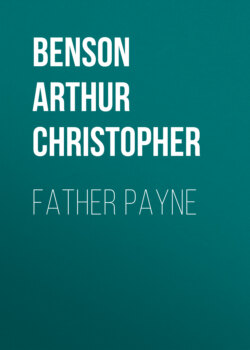Читать книгу Father Payne - Benson Arthur Christopher - Страница 29
На сайте Литреса книга снята с продажи.
CONVERSATION
ОглавлениеI am going to try to give a few impressions of talks with Father Payne—both public and private talks. It is, however, difficult to do this without giving, perhaps, a wrong impression. I used to get into the habit of jotting down the things he had said, and I improved by practice. But he was a rapid talker and somewhat discursive, and he was often deflected from his main subject by a question or a discussion. Yet I do not want it to be thought that he was fond of monologue and soliloquy. He was not, I should say, a very talkative man; days would sometimes pass without his doing more than just taking a hand in conversation. He liked to follow the flow of a talk, and to contribute a remark now and then; sometimes he was markedly silent; but in no case was he ever oppressive. Occasionally, and more often in tête-à-tête, he went ahead and talked copiously, but this was rather the exception than the rule. I have not thought it worth while to try to give the effect of our own talk. We were young, excitable, and argumentative, and, though it was at the time often delightful and stimulating, it was also often very crude and immature. Father Payne was good at helping a talker out, and would often do justice to a clumsily-expressed remark which he thought was interesting. But he was by far the most interesting member of the circle; he spoke easily and flowingly when he was moved, and there always seemed to me a sense of form about his talk which was absent from ours. But under no circumstance did he ever become tedious—indeed he was extremely sensitive to the smallest signs of impatience. We often tried, so to speak, to draw him out; but if he had the smallest suspicion that he was being drawn, he became instantly silent.
There is more coherence about some of the talks I have recorded than was actually the case. He would diverge to tell a story, or he would call one's attention to some sight or sound.
Moreover his face, his movements, his gestures, all added much to his talk. He had a way of wrinkling up his brows, of shaking his head, of looking round with an awestruck expression, his eyes wide open, his mouth pursed up, especially when he had reached some triumphantly absurd conclusion. He had two little quick gestures of the hands as he spoke, opening his fingers, waving a point aside, emphasizing an argument by a quick downward motion of his forefinger. He had, too, a quick, loud, ebullient laugh, sometimes shrill, sometimes deep; and he abandoned himself to laughter at an absurd story or jest as completely as anyone I have ever seen. Rose was an excellent mimic, and Father Payne used to fall into agonising paroxysms of laughter at many of his representations. But he always said that laughter was with him a social mood, and that he had never any inclination to laugh when he was alone.
So the record of his talks must be taken not as typical of his everyday mood, but as instances of the kind of things he said when he was moved to speak at large; and even so they give, I am aware, too condensed an impression. He never talked as if he were playing on a party or a companion with a hose-pipe. There was never anyone who was more easily silenced or diverted. But to anyone who knew him they will give, I believe, a true impression of his method of talk; and perhaps they may give to those who never saw him a faint reflection of his lively and animated mind, the energy with which he addressed himself to small problems, and the firm belief which he always maintained, that any evidence of life, however elementary, was more encouraging and inspiring than the most elaborate logic or the profoundest intellectual grasp of abstract subjects.
